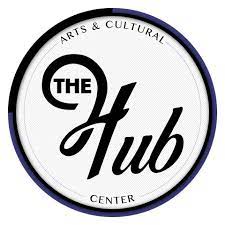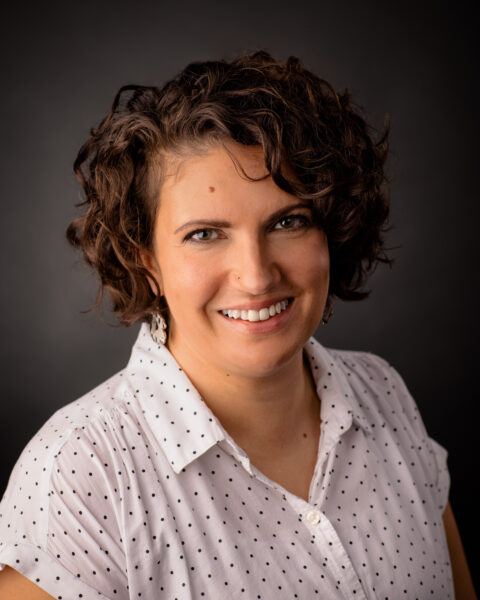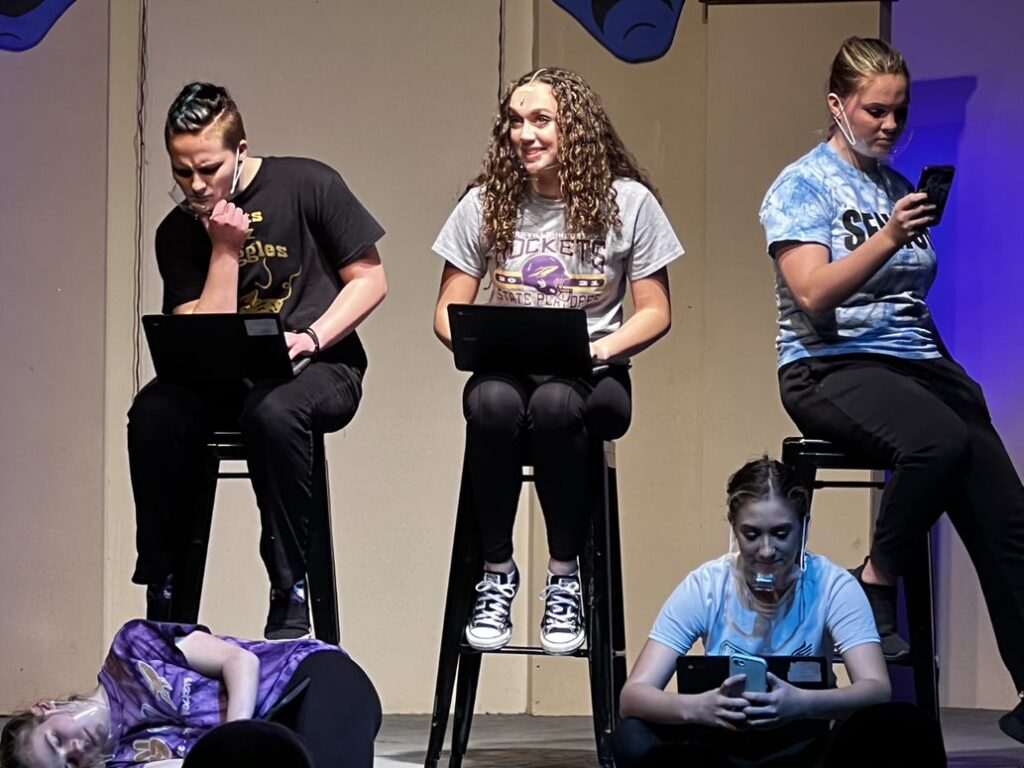Q&A with Erin Eveland, Executive Director, The HUB Arts & Cultural Center
The Project…
“Losing Normal”
Location: Rushville, Illinois
The Hub Arts and Cultural Center invited high school students from Schuyler County to write and produce a storytelling performance piece, “Losing Normal,” about their experiences during the COVID-19 pandemic and the ways in which it affected their lives. The project was carried out in partnership with Becky Jones and Tonya Woods.
The Organization…
 The Hub Arts & Cultural Center
The Hub Arts & Cultural Center
Founded in 2015, The Hub seeks to offer artistic and cultural activities relevant to the people of Schuyler and surrounding counties. It’s mission is to create and maintain a connection between the arts, rural culture, and their local communities through exhibitions and educational experiences.
Follow @thehubart: Website | Facebook | Instagram
The Q&A…
Q1: How do you see the arts/culture/humanities as being essential?

Erin Eveland: I think a big part for me is the wellbeing, the mental health part of the humanities and the arts, especially during the pandemic, which has brought that to me to the forefront. Especially the project we’re doing, the response from the community throughout the pandemic, which has been on the mental health side, keeping people busy, creating. There is nothing political about it; it’s simply nice to have the outlet for people, and that’s what “Losing Normal” was about. Not the political side of anything, more the kids reacting to the pandemic, and their thoughts and feelings, and them not having a voice. For me, the humanities give voice to the voiceless.
Q2: What is the most important thing people should know about your work?
Erin Eveland: The HUB is really unique because of its location. We are a very rural entity. The town we’re in has 3,000 people in it. And the area we serve has 10,000, but we are serving four different counties. For us to have an arts center, a cultural center in the middle of the corn fields is interesting and unique. There are other arts centers out there that are rural based, but they are few and far between. We don’t see many that are doing what we are doing. We’re trying to tie rural culture in with the arts and really looking at regional artists to exhibit; our exhibits are focused on nationally known people but also focused on people who bring relatable work to our community. So people in our community can see there are rural artists working. Even the current exhibit ‘Field Work’ – artist Doug Johnson is from Bloomington – but the work focuses on rural landscapes; even though Bloomington is much bigger than Rushville, you see the same kind of imagery here, and people recognize it as being Illinois.
Q3: How did you arrive at doing what you do?
Erin Eveland: I was an art teacher for 13 years in Brown County, and I had every intention of retiring as a teacher, never doing anything else, and being a practicing artist. A group of us realized that as artists in the area we were missing something. Rushville and Schuyler County are artistic communities, and culturally grounded. So we were looking at different places, and my husband I were looking to move for our kids to have more opportunities in their lives. And we asked why can’t we have those things here – we love the community, the kids love their schools, we love our friends, so why not bring the things here. From that question we started The HUB. So I ended up leaving education and starting my journey as an Executive Director, with that question why not here. I think a lot of people in rural areas are looking for something more, but don’t necessarily ask the question ‘Why not here?’ I think it’s important to ask that question. There has been a migration back to rural areas and I think people have started to explore that value with what small towns bring.
For me – I was a teacher for so long, and at some point I grew and it was time for me to move on. It was scary making that jump from education to being an e.d. Being a teacher, you know where the next paycheck is coming from and have that stability. I have a Master’s in Education and so much of my educational background has helped me in my job as e.d. Especially my Master’s degree – going through statistics classes and research writing classes help me to write grants, to understand the numbers, and find reliable research. I was on the strategic planning committee at my school, so was able to bring that in to my job as well. It’s been a journey, but I’m glad I’m not teaching anymore – during the pandemic the teachers have had it really tough. I’m glad I am where I am. I can’t see myself doing anything else. But that’s how teaching was too!
Q4: Who makes your work possible?
Erin Eveland: A lot of this is made possible through donors and sponsors. We have a strong support of the arts and culture in Rushville and Schuyler County, so that helps a lot. When I first started The HUB I did a needs assessment, to see if people would be willing to donate to us and to help support programs. The needs assessment told us that we would be supported. Our donors and sponsors have been really key for us. Also, grants through the Tracy Family Foundation – they have been a huge supporter of the work we’re doing. And I’ve worked with them closely – in general they’ve given us great opportunities – not just funding but e.d. training, nonprofit, fundraising training, etc. So they’re an amazing resource to have. And we receive support from Illinois Humanities, the Illinois Arts Council Agency, United Way, Two Rivers Arts Council. And since the pandemic we have been able to up our grants with all of those funders and relief grants, which has helped to bring the second person to our organization. We now have two fulltime employees, a big deal with us. We’re getting ready to celebrate our facilities’ fifth anniversary. Rushville has an anonymous donor and really we would not be anywhere without them. They gave us money for the building, the renovation, furnishings, etc., when we were first getting started. We got our 501c3 – they asked us for a wish list, and gave us money to purchase a building and renovate it. As a result, we have no mortgage, or the other expenses that other places have. We would not be able to function as we do without the lump sum from them. That was amazing. So when I say Rushville and Schuyler County support the arts, the anonymous donor is a huge asset.
Suggested Reading:
There is a book for executive directors (e.d.) that deals with burnout. It is The Happy, Healthy Nonprofit: Strategies for Impact without Burnout. I read it before I became an e.d., and gave it to a friend who was also a new e.d. It is about worklife balance, for anyone running a nonprofit.
About The Illinois Humanities Grantee Partner Spotlight
Illinois Humanities highlights the work of our Community Grants program partners through our “Grantee Spotlight.” It shines the light on our grantee partner’s work, offering details about the organization and the funded project, as well as a Q&A with a team member at the organization. More: ILHumanities.org/Spotlight
About Illinois Humanities
Illinois Humanities, the Illinois affiliate of the National Endowment for the Humanities, is a statewide nonprofit organization that activates the humanities through free public programs, grants, and educational opportunities that foster reflection, spark conversation, build community and strengthen civic engagement. We provide free, high-quality humanities experiences throughout Illinois, particularly for communities of color, individuals living on low incomes, counties and towns in rural areas, small arts and cultural organizations, and communities highly impacted by mass incarceration. Founded in 1974, Illinois Humanities is supported by state, federal, and private funds.
Learn more at ilhumanities.org and on Facebook, Twitter, Instagram, and LinkedIn @ILHumanities.
